Top 10 Foods Highest in Histidine
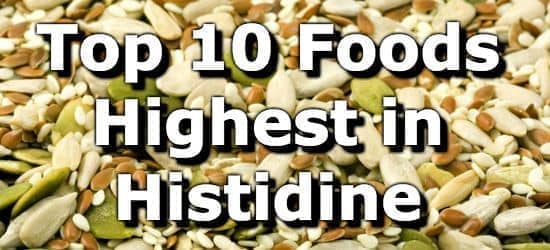
Histidine is an essential amino acid required for growth and tissue repair, blood cell production, and creation of the neurotransmitter histamine. Histidine can even help protect tissues from damage caused by radiation or heavy metals. (1)
High histidine foods include pork, beef, lamb, chicken, turkey, fish, soy, beans, milk, cheese, nuts, seeds, whole grains, and eggs. (2) The reference dietary intake (RDI) of histidine is 10mg per kilogram of body weight or 4.5mg per pound. A person weighing 70kg (~154 pounds) should consume around 700mg of histidine per day. (3)
Below is a list of the top 10 foods highest in histidine with the %RDI calculated for someone weighing 70kg (154lbs). For more high histidine foods see the extended list of histidine-rich foods.
List of Foods High in Histidine
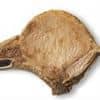 1 Pork Chops
1 Pork Chops| Histidine in 1 Pork Chop | Histidine per 100g | Histidine per 200 Calories |
|---|---|---|
| 2225mg (318% RDI) | 1080mg (154% RDI) | 847mg (121% RDI) |
More Pork Products High in Histidine
- 227% RDI in a cup of lean roast ham
- 133% RDI in a bratwurst
- 72% RDI in 3 slices of bacon
 2 Beef (Skirt Steak)
2 Beef (Skirt Steak)| Histidine per 6oz Steak | Histidine per 100g | Histidine per 200 Calories |
|---|---|---|
| 2198mg (314% RDI) | 1293mg (185% RDI) | 965mg (138% RDI) |
More Red Meat High in Histidine
- 147% RDI in 3oz of lamb roast
- 138% RDI in 3oz of beef roast
- 101% RDI in a 3oz hamburger
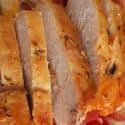 3 Lean Chicken Breast
3 Lean Chicken Breast| Histidine in a 6oz Breast | Histidine per 100g | Histidine per 200 Calories |
|---|---|---|
| 2032mg (290% RDI) | 1195mg (171% RDI) | 1522mg (217% RDI) |
More Poultry High in Histidine
- 262% RDI in a roast chicken leg
- 99% RDI in 3oz of turkey roast
- 93% RDI in a 3oz turkey patty
 4 Tuna
4 Tuna| Histidine in a 6oz Fillet | Histidine per 100g | Histidine per 200 Calories |
|---|---|---|
| 1496mg (214% RDI) | 880mg (126% RDI) | 957mg (137% RDI) |
More Fish High in Histidine
- 188% RDI in a 6oz snapper fillet
- 182% RDI in a 6oz salmon fillet
- 173% RDI in a 6oz cod fillet
See all fish high in histidine.
 5 Firm Tofu
5 Firm Tofu| Histidine per Cup | Histidine per 100g | Histidine per 200 Calories |
|---|---|---|
| 1086mg (155% RDI) | 431mg (62% RDI) | 599mg (86% RDI) |
- 110% RDI per cup of boiled soybeans
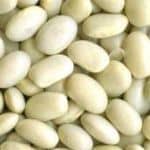 6 Canned Navy Beans
6 Canned Navy Beans| Histidine per Cup | Histidine per 100g | Histidine per 200 Calories |
|---|---|---|
| 542mg (77% RDI) | 207mg (30% RDI) | 366mg (52% RDI) |
More Beans High in Histidine
- 72% RDI per cup of lentils
- 67% RDI per cup of kidney beans
- 64% RDI per cup of white beans
See all beans high in histidine.
 7 Milk
7 Milk| Histidine per 16oz Glass | Histidine per 100g | Histidine per 200 Calories |
|---|---|---|
| 500mg (71% RDI) | 102mg (15% RDI) | 600mg (86% RDI) |
More Dairy High in Histidine
- 82% RDI per 1/2 cup of ricotta
- 56% RDI per oz of grated Parmesan
- 50% RDI per cup of yogurt
See all dairy foods high in histidine.
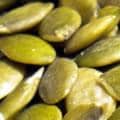 8 Seeds (Squash and Pumpkin Seeds)
8 Seeds (Squash and Pumpkin Seeds)| Histidine per 1oz Handful | Histidine per 100g | Histidine per 200 Calories |
|---|---|---|
| 219mg (31% RDI) | 770mg (110% RDI) | 268mg (38% RDI) |
More Nuts and Seeds High in Histidine
- 39% RDI per oz of hemp seeds
- 22% RDI per oz of almonds
- 22% RDI per oz of sunflower seeds
- 22% RDI per oz of pistachio nuts
- 22% RDI per oz of chia seeds
- 19% RDI per oz of flax seeds
See all nuts and seeds high in histidine.
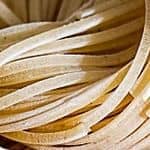 9 Whole Wheat Pasta
9 Whole Wheat Pasta| Histidine per Cup | Histidine per 100g | Histidine per 200 Calories |
|---|---|---|
| 164mg (23% RDI) | 140mg (20% RDI) | 188mg (27% RDI) |
More Grains High in Histidine
- 36% RDI per cup of kamut
- 34% RDI per cup of quinoa
- 32% RDI per cup of teff
- 19% RDI per cup of brown rice
- 18% RDI per cup of oatmeal
See all grains high in histidine.
 10 Eggs
10 Eggs| Histidine in 1 Large Egg | Histidine per 100g | Histidine per 200 Calories |
|---|---|---|
| 149mg (21% RDI) | 298mg (43% RDI) | 385mg (55% RDI) |
Printable One Page Sheet
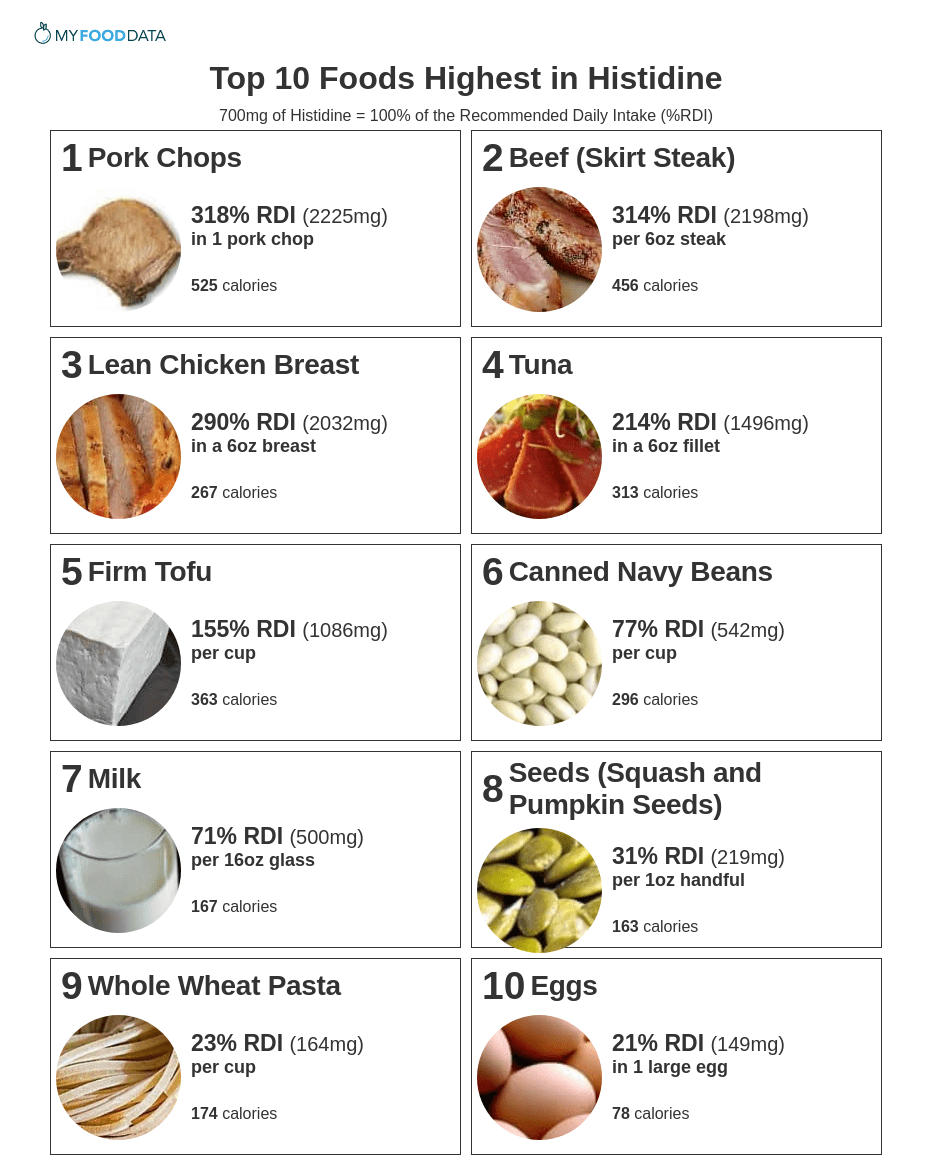
More Histidine Rich Foods
| Food | Serving | Histidine |
|---|---|---|
| 1 Subway Tuna Sub | per 6 inch sub | 232% RDI (1626mg) |
| 2 Kielbasa Sausage | per large link | 189% RDI (1321mg) |
| 3 Cooked Eel | per 5.6oz fillet | 158% RDI (1107mg) |
| 4 Soy Based Protein Powder | per 2oz scoup | 97% RDI (680mg) |
| 5 Toasted Wheat Germ | per oz | 33% RDI (230mg) |
| 6 Canned Eastern Oysters | 1 cup (drained) | 31% RDI (220mg) |
| 7 Gelatin | per 1oz package | 26% RDI (185mg) |
| 8 Peanut Butter | per 2 tblsp | 25% RDI (178mg) |
| 9 Green Peas | per cup cooked | 24% RDI (168mg) |
| 10 Fish Roe (Ikura, Caviar) | per tblsp | 12% RDI (85mg) |
About the Data
Data for the curated food lists comes from the USDA Food Data Central Repository.
You can check our data against the USDA by clicking the (Source) link at the bottom of each food listing.
Note: When checking data please be sure the serving sizes are the same. In the rare case you find any difference, please contact us and we will fix it right away.
About Nutrient Targets
Setting targets can provide a guide to healthy eating.
Some of the most popular targets include:- Daily Value (%DV) - The daily value (%DV) is a general guideline for consumption that will prevent deficiency of a particular nutrient in most people. The %DV refers to the percentage of an amount that's found in a single serving of a food. It also accounts for absorption factors. It is set by the U.S. FDA.
- Recommended Dietary Allowance (%RDA) - The RDA sets an average daily dietary intake level that is sufficient to meet the nutrient requirements of nearly all (97.5%) healthy individuals. It's more specific than the daily value, and varies by age and gender. The RDA is set by the US National Instutites of Health.
- Reference Dietary Intake (%RDI) -The reference dietary intake is similar to the recommended daily allowance, but is specific to age and gender. The RDI for amino acids is set by the U.N. World Health Organization.
- Adequate Intake (%AI) - This value is primarily used in reference to omega-3 and omega-6 fats. The Adequate Intake is set by the U.S. Institute of Medicine. Because there is less evidence to determine the ideal targets for consumption of these nutrients, the specific amount is considered to be less reliable. Using the term Adequate Intake, rather than one of the other terms, helps to emphasize that the ideal intake of that particular nutrient has not yet been scientifically determined.
See the Guide to Recommended Daily Intakes for more information.
Want to set your own targets? Sign up for an account and set custom targets in the daily meal planner.From the Nutrient Ranking Tool
Use the ranking tool links below to select foods and create your own food list to share or print.
- Foods High in Histidine
- Foods Low in Histidine
- Vegetables High in Histidine
- Fruits High in Histidine
- Vegetarian Foods High in Histidine
- Nuts High in Histidine
- Grains High in Histidine
- Beans High in Histidine
- Dairy High in Histidine
- Breakfast Cereals High in Histidine
- Fast Foods High in Histidine
View more nutrients with the nutrient ranking tool, or see ratios with the nutrient ratio tool.
Related
- Amino Acid Protein Calculator
- High Phenylalanine Foods
- High Valine Foods
- High Cysteine Foods
- High Methionine Foods
- High Threonine Foods
- High Leucine Foods
- High Tryptophan Foods
- High Protein Foods
- Vegetables Highest in Protein
- Fruits Highest in Protein
- Cheeses Highest in Protein
- Beans and Legumes Highest in Protein
Data Sources and References
- NIH Pubchem Histadine Entry
- U.S. Agricultural Research Service Food Data Central
- World Health Organization (WHO) Technical Report Series – Protein And Amino Acid Requirements In Human Nutrition ISBN 978 92 4 120935 9
Try the recipe nutrition calculator, or daily meal planner.
Create a free account to log and track foods.
